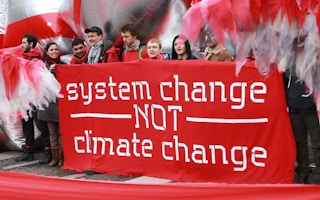A global climate agreement was adopted in Paris on Saturday evening, but it will leave activists demanding direct action on fossil fuels and energy market reform.
Before the Paris talks even began there were activists arguing that the negotiations would not deliver what they want. The Climate Justice Action network said that the COP21 will continue a 20 years of ineffective climate policy, demonstrated by a 65 per cent rise in fossil fuel emissions since 1990.
Naomi Klein said she “refused to put our future in the hands of [negotiators] cloistered in the Bourget”. Klein places more hope in bottom-up energy democracy.
Meanwhile, Saturday’s protests were about saying campaigns for climate justice will continue.
Has activist pessimism about the agreement been justified?
The Paris Agreement doesn’t stack up
Klein argues that there is some “good language” in the agreemnt. The Paris text recognises the need to cap temperature rises at 1.5℃. However, the language doesn’t match national pledges for action. These pledges are so weak that a dangerous 3 or 4 degrees warming is likely.
The agreement also notes “the importance for some of the concept of “climate justice”, when taking action to address climate change.” But the substance of agreement falls far short of what movements mean by the term.
One of the main issues activists have raised is the absence of reference to fossil fuels in the Paris Agreement. The agreement aims for “balance between anthropogenic emissions by sources and removals by sinks” after 2050.
Reference to reducing fossil fuels, or even “decarbonisation” would have been better. The vague language of “balance” between (fossil fuel) “sources” and “sinks” opens up the possibility for loopholes, such as “forest carbon offsets” and technologies activists oppose such as “clean coal” and nuclear energy.
Loopholes are familiar terrain for Australian negotiators, who have secured the continuation of a 1997 land carbon accounting loophole to meet Australia’s 2020 target. It is an accounting rule that will allow further emissions increases in energy and industrial sectors with no penalty.
Opaque carbon terminology typical in climate agreements turns the climate issue into an unhelpful abstraction. The concrete problems climate movements want addressed are about energy and inequalities, which are systemic and difficult to change.
Movements want ‘system change’
Activist pessimism about the Paris Agreement reflects the fact climate movements want to change society and transform energy systems more rapidly and fundamentally than the UN system allows for. They do this by bringing people together, online and in public spaces, to put pressure on governments and corporations to change.
The climate movement is a contemporary version of what Immanuel Wallerstein called “anti-systemic movements”. Anti-systemic movements want to transform societies, and in this case, humanity’s relationship with ‘nature’.
Movements calling for “climate justice”, carry on traditions of the alter-globalisation movement, other forms of environmentalism, feminism, anti-colonial and socialist movements.
Climate justice movements are diverse, but there is a fundamental principle informing activist practice: climate change is a consequence of unequal, colonial, economic and social power relations.
Protests during the Paris negotiations illustrate the diverse strands of this anti-systemic agenda. The slogans were “Flood the system” and “Connect the dots”. Flood the system is a reference to anti-capitalist protests during the peak of the financial crisis. Connecting the dots means recognising the links between climate change and systemic inequalities.
“
This week’s climate negotiations were one moment in a long battle. Activists are moving “through” and “beyond” Paris and will continue campaigns against fossil fuel dependence and for a “just energy transition”.
Activists consistently point out that the impacts of climate change are greatest for marginal social groups, and that historical responsibility for climate change is concentrated in a small number of corporate and government hands.
Their analysis was symbolised in protests in the past weeks. The People’s Climate March and the People’s Parliament protest were both represented by Pacific Islanders, indigenous people, and mining-affected community members. They targeted Parliament, as well as a bank and fossil fuel company and coal infrastructure.
Given that climate justice movements want systemic change, it’s unsurprising that the Paris Agreement is not enough for activists. However, this is not to say that anti-systemic movements simplistically oppose all reform, or that movements don’t create new policy agendas.
Movements want reform too
There are two strong messages from activists about energy policy.
- There needs to be a limit placed on fossil fuels
- There needs to be regulation and public investment to facilitate affordable renewable energies.
As time as gone on, the political focus on abstract carbon targets and carbon pricing has diminished. Climate organisations like 350.org have translated their focus on global carbon target of 350ppm (a technical term for concentration of greenhouse gases in the atmosphere) into connected local campaigns to keep fossil fuels in the ground.
There are new research organisations documenting the fossil fuel assets that need to be retrenched in order to stay within a 1.5-2-degree limit. This year’s Australia Institute campaign for “no new coal mines” is concrete policy that would help keep fossil fuels in the ground.
Whether or not direct regulation of energy markets is politically feasible is an unanswered question. However, seeking change through complex and ineffective emissions policy like carbon trading has also been difficult for activists.
The road from Copenhagen goes beyond Paris
The last major climate talks held in Copenhagen in 2009 saw public protests like those last week. There was a broad sense that it was the last chance for a global agreement that could avoid dangerous climate change.
When the Copenhagen Accord was deemed a flop, a sense of failure was keenly felt by climate movements. The numbers of people engaged in climate activism dropped considerably from 2010.
But activists did continue to mobilise. After Copenhagen the social and environmental effects of Australia’s export mining boom in coal and gas were intensifying. New campaign organisations such as Lock the Gate and Land Water Future changed Australian climate politics. These groups are resisting fossil fuels, but climate mitigation is not the only, or central, motivation.
Food and water security, indigenous land rights, and farmer’s property rights have become much more salient than ever before. These campaigns have led to temporary moratoriums on coal seam gas, numerous inquiries, new water protections, and a debate about whether land owners should be able to say no to fossil fuel companies.
Renewable energy campaigns have matured since 2009, with new citizens campaigns developing the case for community renewable energy projects and fair access to the electricity grid for Australia’s 1.4 million rooftop solar owners. While these campaigns have struggled to get new policies, the resilience of the Renewable Energy Target is evidence that governments cannot risk losing voters who support renewables.
This week’s climate negotiations were one moment in a long battle. Activists are moving “through” and “beyond” Paris and will continue campaigns against fossil fuel dependence and for a “just energy transition”.
In doing so, movements will go on highlighting the failures of climate policy. They are changing what is politically feasible for Australian governments.
![]()
Rebecca Pearse is a Research Associate, University of Sydney. This article was originally published on The Conversation.


















